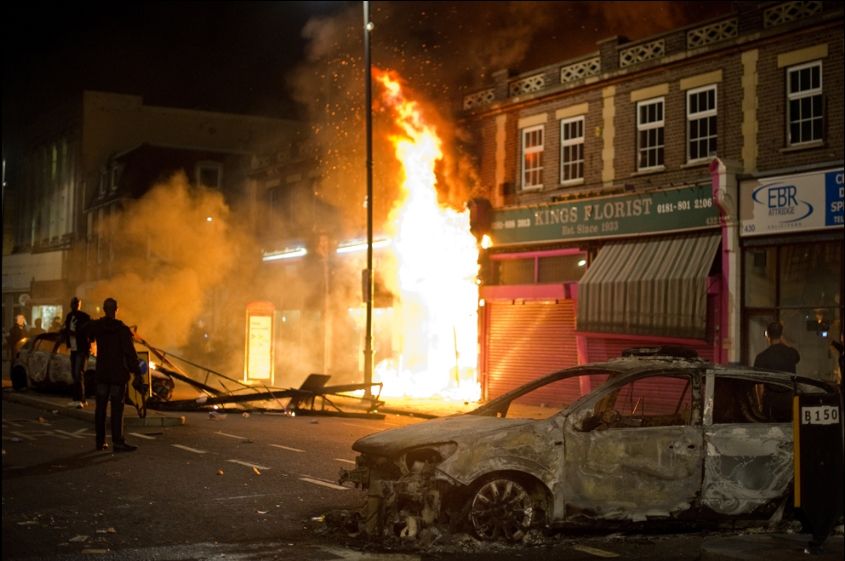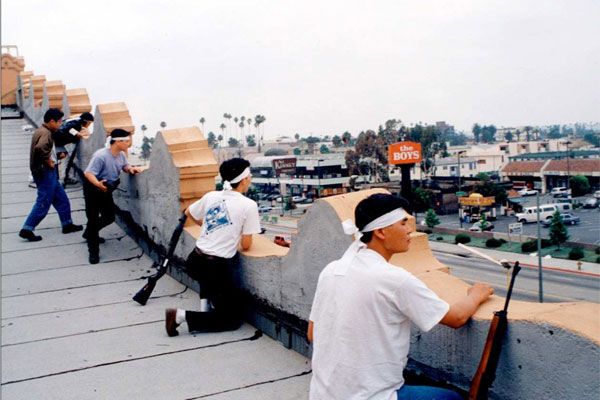Trevor Reeves said his business which has been in his family for five generations has been “completely trashed”
—
Shops were looted and buildings set alight as police clashed with youths. The trouble also spread to Birmingham, Liverpool, Manchester and Bristol.
- Several fires broke out in Croydon, including one at a large sofa factory which spread to neighbouring buildings and tram lines
- In Hackney 200 riot officers with dogs and mounted police were located around Mare Street where police cars were damaged
- Looters raided a Debenhams store and a row of shops in Lavender Hill in Clapham, as well as shops in Stratford High Street
- A Sony warehouse in Solar Way, Enfield, a shopping centre in Woolwich New Road, a timber yard in Plashet Grove, East Ham and a building on Lavender Hill were all on fire
- More than 100 people looted a Tesco store in Bethnal Green, the Met said, and two officers were injured
- Cars were set on fire in Lewisham
- A bus and shop were set alight in Peckham
- Buses were diverted as the violence spread to Bromley High Street
- There were reports of looting of phone shops in Woolwich High Street, in south London, and a torched police car
- Shops and restaurants were damaged in Ealing, west London, and there was a fire in Haven Green park opposite Ealing Broadway Tube
- Football matches at Charlton and West Ham which were due to be played on Tuesday have been postponed at the request of the police
- At Clapham Junction looters stole masks from a fancy dress store to hide their identity
—
One resident in Croydon, who gave his name as Adam, said he saw two cars which had been set on fire.
He said: “One older woman was dragged out and they set the car on fire. Then another car around the corner was on fire, then we counted about 12 to 15 shops that had been looted.
“The looting started about three hours ago. I just came back into my apartment and the looting was still going on – not a single policeman.”
That’s not all that unusual in incidents like this. There just aren’t enough police. So what you get is:




What you won’t see is this:

Those are Koreans protecting a shop during the Los Angeles riots in 1992, when the police were nowhere to be found. You won’t see pictures of people defending their property against looters in London – that would get them arrested.
I expect the number of Brits fleeing Airstrip One for greener pastures will now increase above the 200,000 or so that have been leaving annually.
UPDATE:
Police lose control of streets shop owners form local “protection units”
News Desk 9am Sunday
Shop owners along Wood Green, Turnpike Lane and Green Lanes, the majority of which are of Kurdish or Turkish owned have formed local protection units following riots in Tottenham which have spilled over to Wood Green.
“We do not have any trust in the local police, our shops are next on the target list by the thugs who have ransacked Tottenham, we will protect our property”, said a leading member of the Green Lanes “unit”.
Shop owners have been seen by London Daily News reporters carrying crow bars, and other objects in case of attacks.
But, thankfully, no pictures which would be used as evidence against them.


